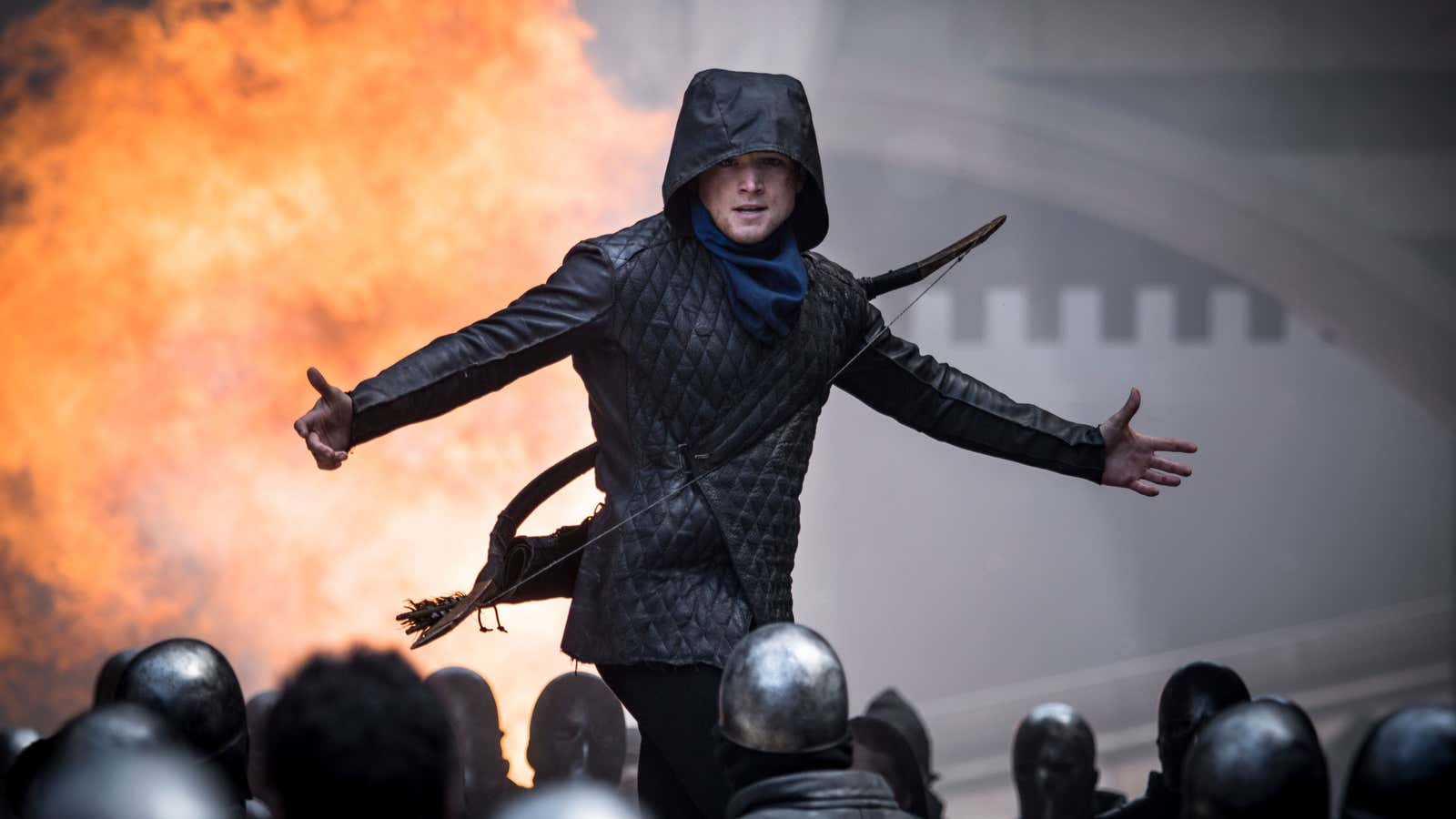Robin Hood famously “stole from the rich to give to the poor.” Odd, since that’s pretty much the inverse of what Hollywood’s many adaptations of the Robin Hood legend have done: take moviegoers’ hard-earned cash every few years, and in exchange give us very bad Robin Hood movies. The rich get richer; the rest of us get “Robin Hood, but hip.”
If the legendary Sherwood-Forest-dweller ever existed at all (some historians believe that the real man from whom the legends are derived was actually a petty thief, not a heroic swashbuckler), Robin would certainly disapprove of the perpetual exploitation of his story for corporate gain. The latest Hollywood adaptation—Robin Hood, out in theaters today (Nov. 21)—could be the worst of them all.
The film, starring the Welsh heartthrob Taron Egerton as the titular outlaw, is being panned by critics, who are almost unanimously deeming it a disaster: “Gird your loins for a misguided attempt to profit off the public domain that takes its one big idea—what if we marketed 15th century class warfare to millennials?—and leans into it so hard that the movie starts to feel less like Robin Hood than it does a castrated ‘Riverdale’ spin-off for Bernie bros,” wrote David Erhlich of Indiewire. ”By the way, gasoline exists in the Middle Ages now—as do midriff tops, wire-rimmed glasses, roulette, the entire Industrial Revolution, and my permanently bewildered expression,” io9’s Beth Elderkin wrote.
Those hoping that Robin Hood would be modern in ways other than the cast’s sartorial choices will probably leave the theater disappointed. “I won’t waste time talking about Marian, the movie’s only notable female character, because she fails every representation test there is,” Elderkin wrote. ”She’s worse than a ‘Sexy Lamp,’ she’s a Human Stare. All she does is look at stuff, lips partially opened, waiting to have a thought. She bought her clothes in Forever 21’s Reign section.”
It would be unfair to pick on the 2018 Robin Hood without mentioning some of Hollywood’s many previous debacles. There was, of course, Ridley Scott’s 2010 Robin Hood film starring Russell Crowe, a film whose critical panning was usurped only by its dismal box office returns. Though it later achieved a cult following, the 1993 spoof Robin Hood: Men in Tights was one of Mel Brooks’ least successful films both critically and commercially. Even Disney’s 1973 animated Robin Hood movie was a bust, and remains one of the Mouse House’s rare misfires. Robin Hood: Prince of Thieves, starring Kevin Costner, performed relatively well in 1991, but that’s setting the bar quite low. You’d have to go back to 1938 for the Technicolor sensation The Adventures of Robin Hood, starring a dashing Errol Flynn, to find an indisputably successful Hollywood adaptation of the Robin Hood legend.
So why is such a universally resonant tale about fighting injustice and oppression so difficult to make interesting? Perhaps it’s precisely that it’s too universal, too generic—an innocuous blank slate that inspires either bland filmmaking or, in the case of this 2018 film, desperate, revisionist attempts to make the centuries-old legend socially or politically relevant to the era of its adaptation.
In a piece for Smithsonian Magazine, James Deutsch, a curator at the Smithsonian Center for Folklife and Cultural Heritage, noted that Robin Hood adaptations tend to pop up every generation, often during times of US economic turmoil. “Folklore comes from the folk, which is why ‘robbing the rich to give to the poor’ is a motif that has endured for centuries in the imagination of the people,” he wrote.
The first feature-length Robin Hood, a silent film in 1922, followed a recession in the aftermath of World War I, Deutsch observed. Errol Flynn’s turn as the hooded bandit came in the midst of the Great Depression. And Ridley Scott’s 2010 film was released during the fallout from the 2008 financial crisis.
It’s unsurprising that Hollywood tries to exploit working class fears for profit, with the Robin Hood character recurring in troubled times as an avatar of resistance to the fat-cat elites. Except, these movies are almost always bad investments.
The US economy is relatively stable today, though income inequality is still an enormous problem in the US and globally. As long as that remains the case, the Robin Hood story will resonate, and Hollywood will keep trying to cash in on it. There are already several more Robin Hood films development.
